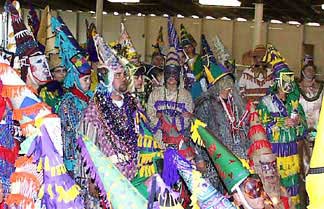When I taught at Beau Chene High School, I asked the students to tell me about home remedies that their families used. The students all told of the "nasty tastin'" mongreae tea. I hadn't heard of it, but the students all nodded their heads. One boy, Chwayne Esprit said, "ma grandmother makes dat mongreae tea! She try to put some peppermint or honey in there or something, but it don't work! it still tase naaaaasty!! the tea works, though."
I offered extra credit for this mysterious mongrea plant, and the very next morning, Kelly Carmouche showed up with a branch wrapped in a plastic grocery bag and hung it on my doorknob before school. I immediately recognized it as a "trash" scrub plant that grew in utter abundance in our fallow field and along every ditch and coulee in Saint Landry Parish. I have since learned that manglier means mangrove (and come to think of it, the bushes do resemble a mangrove, but they grow in the prairie, not the water).
How I do it: Boil two or so cups of water with a handful or two of manglier leaves. Boil the leaves, strain. Sweeten the tisane with a peppermint, cough drop, honey, lemon, whiskey, or any combination of each. Drink a cup three times a day, and even to ward off a cold or sore throat.
Information from:
Groundsel Bush, Manglier
Baccharis halimifolia
Asteraceae
Respiratory, Flu
Leaves, Stem, Root; Tea
Perennial, Tree, Shrub
Groundsel Bush
“When someone gets a fever, give him some tea made with manglier. Serve it in a coffee cup three time per day.”
Manglier is the hidden jewel of the medicinal plant collection. Little
seems to be known about it outside of Louisiana, but it is well known by
our Native American, Cajun and Creole communities as an excellent
remedy for fevers, chills, congestion, and other cold or pneumonia type
symptoms. The leaves of the plant are boiled to make an aromatic
yellow/green brew. Because of its strong, bitter taste, it is usually
served with honey and lemon, a cough drop, or some whiskey to cut the
flavor. Whole branches can be dried and stored for later use. The tea
can be made several times using the same leaves.
Manglier
“Quand quékin gain la fiève, donne li di thé fait avéc menguilié. Donne li ein ti tasse à café trois fois par jour.”
Le manglier est le bijou caché de la collection des plantes médicinales.
On le connaît peu ailleurs au monde, mais il est bien connu des
communautés amérindiennes, cadiennes et créoles comme remède excellent
contre la fièvre, les frissons, la congestion et d’autres symptômes
associés avec un rhume
ou la grippe. On fait bouillir les feuilles pour en faire une tisane
aromatique. À cause de son goût fort et amer, on la sert d’habitude avec
du miel et du citron, une pastille ou du whisky pour la rendre buvable.
On peut faire sécher des branches entières et les garder pour plus
tard. On peut réutiliser les memes feuilles plusieurs fois.


.JPG)
